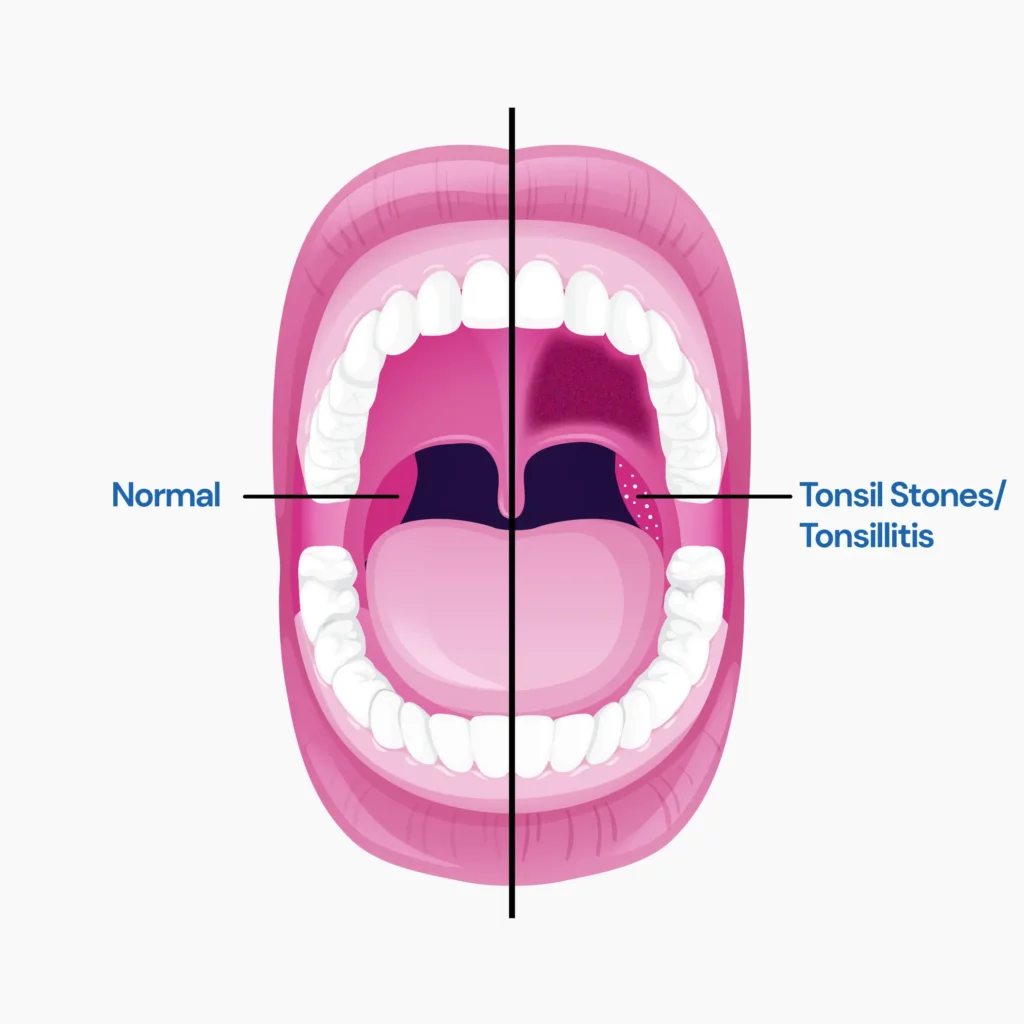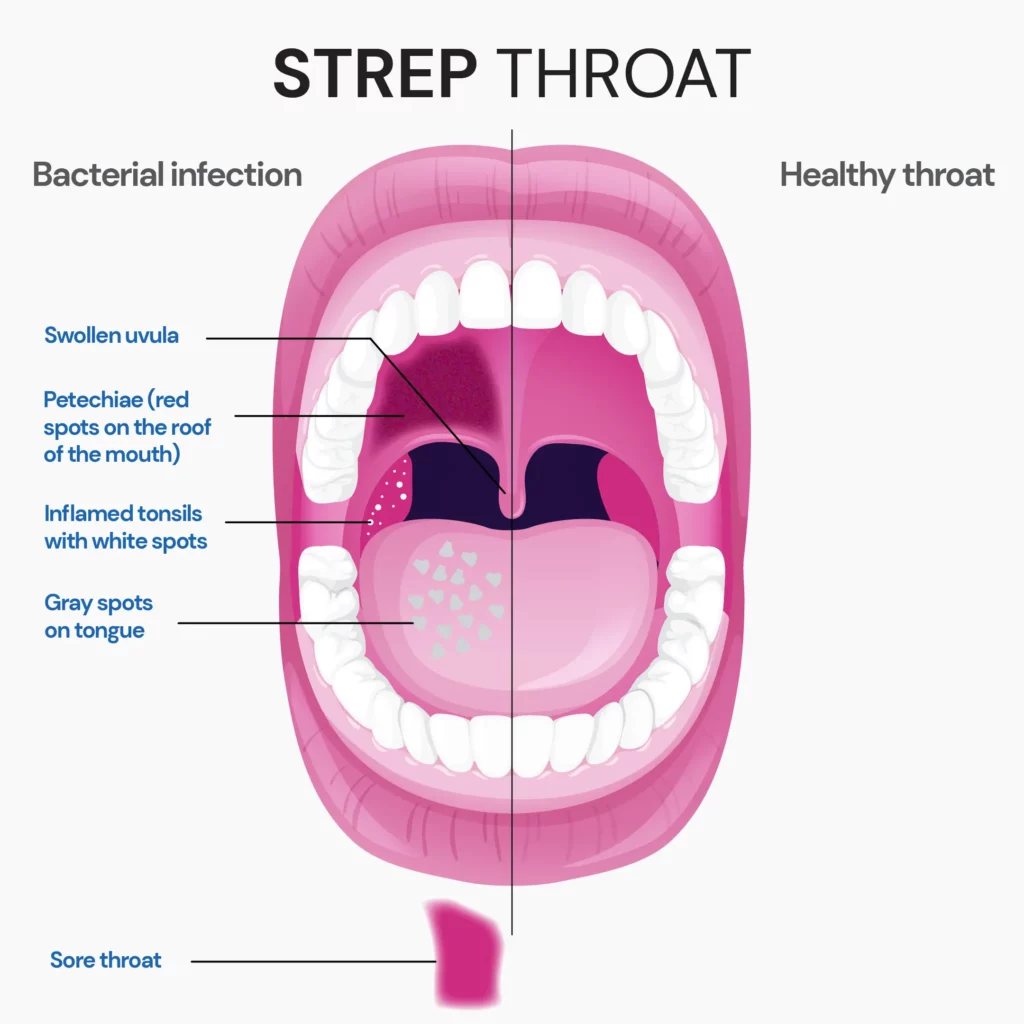Most of us are not strangers to the occasional scratchy, sore throat, an ailment that often heralds the onset of a common cold or a change in the weather. However, at times, what begins as a minor discomfort in the throat can evolve into symptoms that are more persistent and troubling. While many conditions could cause persistent sore throat, two common ones are tonsil stones and strep throat. Despite their distinct natures, both conditions share similar symptoms, like a sore throat, leading to a common dilemma in self-diagnosis. In this article, we aim to clearly differentiate between tonsil stones vs strep throat. We will explore the unique characteristics, causes, symptoms, and treatment methods for each condition.
About Xcode Life
What Is Tonsil Stones?
Tonsils are two round, fleshy masses at the back of your throat.
They are lymph nodes that filter germs that enter the nose and mouth.
Tonsil stones are small white-colored pebble-like stones that form in the tonsils.
They are composed of minerals like calcium, food debris, and germs
Symptoms
Symptoms of tonsil stones and Strep throat infection can be very similar.
Most people may experience the following symptoms:
- Bad breath or halitosis (most common symptom)
- Bad taste in your mouth
- Sore throat
- Pain in the ears
- Pain while swallowing
- The feeling of something being stuck in the throat
Causes
Tonsil stones are formed when food debris gets stuck in the folds of the tonsils.
These folds are usually small, but when debris is trapped, it enlarges them.
This results in minerals like calcium getting deposited and hardening into stones.

Strep Throat
What Is It?
Strep throat is a contagious condition caused by a bacterial infection in the throat and tonsils. Strep throat is more common in children but affects people of all ages.
Symptoms
Common symptoms of strep throat are:
- Sore throat that may appear red with white patches
- Fever
- Headache
- Difficulty or discomfort while swallowing
- Small red spot on the roof of the mouth
Some people may also experience nausea, vomiting, fatigue, and body aches.
Causes
Group A Streptococcus bacteria cause strep throat.

Tonsil Stones vs. Strep - The Differences
How Can You Easily Tell The Difference Between Strep And Tonsil Stones?
Since tonsil stones and Strep throat show similar symptoms, it is often difficult to tell one from the other.
But, here’s how their symptoms are different, making diagnosis easy:
| Symptom | Tonsil stones | Strep throat |
| Runny nose | Absent | Present |
| Sore throat | Present | Present but has a sudden onset |
| Bad breath | Present | Absent |
| Cough | Present | May not be present |
| Postnasal drip | Present | Absent |
| Stiff neck | Present | Absent |
| State of tonsil | White or yellow small stones on tonsils | Swollen or red tonsil with streaks of white pus |
| Nausea and vomiting | Absent | Present |
Do Tonsil Stones Always Mean Strep?
Recurring strep infection or tonsilitis can increase the risk of tonsil stones; but tonsil stones need not always mean that there's an underlying strep infection.
Are The White Spots In Strep Tonsil Stones?
No, not always. The white streaks or spots in strep are usually pus formations due to the infection, unlike the white ones in tonsil stones, which are hardened and calcified stones.
Diagnosis and Treatment: Tonsil Stones vs. Strep
Your doctor will perform a physical examination and check your nose, throat, and ear for signs of infection.
If your doctor suspects strep throat, they will collect a swab from the back of your throat.
If you test negative for Streptococcus bacteria, a throat culture is performed to determine the causative organism of your tonsil stones.
The treatment for tonsil stones and strep throat varies.
Treatment of Tonsil Stones:
In many cases, tonsil stones are treated at home. Some common home remedies include:
- Salt water gargling
- Vigorous coughing to dislodge the stones*
- Using a cotton swab or water pick to push the stones out*
*do not try these at home before consulting a qualified practitioner.
Medications
Your doctor may prescribe antibiotics if required. Some OTC painkillers may also be helpful.**
**do not try these at home before consulting a qualified practitioner.
Surgery
If tonsil stones keep recurring, your doctor may recommend tonsillectomy (a surgery to remove tonsils).
Treatment of Strep throat
Treating Strep throat usually involves a prescription of antibiotics.
Usually, amoxicillin or penicillin is prescribed to treat strep throat.
A single benzathine penicillin G shot is also used to treat strep throat.
Other antibiotics like erythromycin or cephalosporins like cephalexin may be prescribed to those who are allergic to penicillin.
It is important to treat strep throat at the earliest to prevent complications, which include:
- Rheumatic fever
- Post-streptococcal glomerulonephritis
- Invasive GAS infection
Home remedies like gargling with salt water, getting plenty of rest, drinking warm fluids, and lozenges can help relieve sore throat associated with tonsil stones and strep throat.
Prevention: Tonsil Stones vs. Strep
Tonsil stones and Strep throat are contagious and can spread quickly.
You can prevent both conditions by practicing good hygiene, such as:
- Washing hands frequently
- Coughing and sneezing into your elbow and
- Avoid sharing utensils with those infected
Summary
- Tonsils are like lymph nodes in the throat, which filter out germs that enter the body through the nose or mouth.
- Tonsil stones and Strep throat are contagious diseases with similar or overlapping symptoms.
- Tonsil stones occur when food debris builds up in tonsils causing minerals like calcium to deposit and harden, forming small stone-like structures.
- Strep throat occurs due to bacterial infections and is contagious
- If your doctor suspects strep throat, they will collect a swab from the back of your throat.
- Treatment of tonsil stones usually involves home remedies, antibiotic course, and surgical removal of tonsils, if required.
- Strep throat is commonly treated with antibiotics.
- Tonsil stones and Strep throat can be prevented by practicing good hygiene.
References
- https://www.verywellhealth.com/tonsillitis-vs-strep-5272024
- https://www.spartanburgent.com/is-it-tonsillitis-or-strep-throat/
- https://www.medicalnewstoday.com/articles/tonsillitis-vs-strep-throat
- https://www.healthline.com/health/tonsillitis-vs-strep-throat/
- https://khealth.com/learn/strep-throat/tonsillitis-vs-strep-throat/




